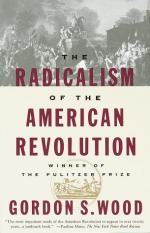
|
| Name: _________________________ | Period: ___________________ |
This test consists of 15 multiple choice questions and 5 short answer questions.
Multiple Choice Questions
1. In colonial America, what was done with a political effigy?
(a) It was burned.
(b) It was buried.
(c) It was hanged.
(d) It was pubically beaten.
2. What was the highest class of British society called?
(a) Monarchy.
(b) Aristocracy.
(c) Egalitarianism.
(d) Hierarchy.
3. When meeting someone new in colonial America, what was required for confidence in dealing with that person?
(a) Common interests.
(b) A mutual acquaintance.
(c) A letter of introduction.
(d) Compatible personalities.
4. Who rejected "ancient prejudices" that supported hereditary monarchy?
(a) Thomas Paine.
(b) John Locke.
(c) Ben Franklin.
(d) Jonathan Sewell.
5. In colonial America, who was rescued from poverty as a fourteen-year-old boy, only to become one of Virginia's most distinguished leaders?
(a) Benjamin Robinson.
(b) Charles Wilson Peale.
(c) Daniel Dulagy.
(d) Edmund Pendleton.
6. In colonial America, what outweighed the concern for family lineage?
(a) Individual desires of the children.
(b) Individual desires of the head of the household.
(c) Individual desires of the mother.
(d) Individual desires of the father.
7. Who vigorously denounced the Stamp Act riots in 1765?
(a) Daniel Moore.
(b) James Otis.
(c) Thomas Hutchison.
(d) Henry Laurens.
8. What did the colonial American courts treat more seriously than violent acts?
(a) Cheating.
(b) Disobedience.
(c) Laziness.
(d) Profanity.
9. What was it called when Ben Franklin appointed his friends and family to official positions after he became Deputy Postmaster General of North America?
(a) Consequentialism.
(b) Prerogativism.
(c) Patronage.
(d) Paucity.
10. In colonial America, which pairs of words were "opposites and irreconcilable"?
(a) Tenant and dependency.
(b) Indentured and dependency.
(c) Freedom and religion.
(d) Freedom and dependency.
11. What percentage of northern colonists were aristocrats?
(a) 8%.
(b) 10%.
(c) 9%.
(d) 11%.
12. In colonial America, what was commonly manufactured in enormous quantities by the farming population?
(a) Preserves.
(b) Rope.
(c) Farm equipment.
(d) Cloth.
13. How did colonial Americans look on black slavery?
(a) As an abomination.
(b) As just another form of dependency.
(c) As a necessary evil.
(d) As an institution which needs legislation.
14. Who was the head of a colonial household?
(a) The matriarch.
(b) The oldest grandfather.
(c) The parents.
(d) The patriarch.
15. In colonial America, what were the aristocracy allowed to engage in that they weren't allowed in Britain?
(a) Gambling.
(b) Use of oaths.
(c) Farming.
(d) Retail trade.
Short Answer Questions
1. How was high office in colonial America considered?
2. How did John Locke view a child's mind?
3. What would eventually secure the people's right to participate in government?
4. Originally in colonial America, how were gentlemen to treat inferiors and subordinates?
5. Historically, what kinds of men are guilty for all wars and tyrannies?
|
This section contains 437 words (approx. 2 pages at 300 words per page) |

|




